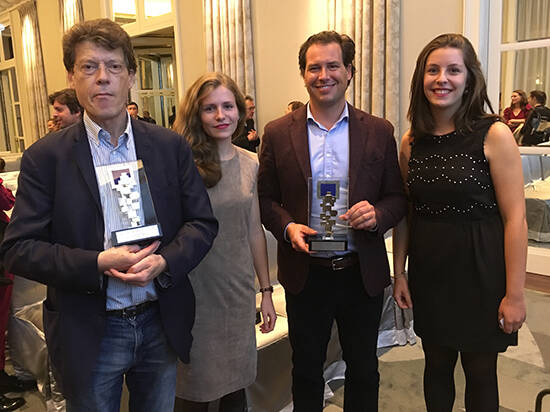ManpowerGroup Foundation / HEC Paris Prize: the Secrets of Digital Technology
The mining of rare metals and the development of artificial intelligence are at the very heart of the current advancements in new technology and renewable energy. But are they a threat to our world? This tension is central to the two works that took home the three literary prizes awarded by ManpowerGroup Foundation and HEC Paris on 4th October 2018. The winning authors’ sobering but rousing speeches summed up the event’s outlook, as they offered a bleak assessment of a world seemingly heading for the precipice.

The two juries of the ManpowerGroup Foundation / HEC Paris Prize considered over 150 works representing 41 publishers before handing out prizes that, since 1996, have rewarded books encouraging a fundamental debate about issues linked to business and society. Ever since HEC Paris became part of this initiative in 2008, Christian Boghos, President of the ManpowerGroup Foundation, has called for the prizes to shine a spotlight on the changes disrupting our world. During the award ceremony, he pointed out that “the prize-winning works flag up the issues that we will be discussing in the years to come. They focus on the concerns of our age, and, as we have seen this year, it is an age rife with political incorrectness. It is vital that HEC join us in this reconnaissance mission.”
Journalist Guillaume Pitron’s first book, The War of Rare Metals (La guerre des métaux rares , published by Les liens qui libèrent in 2018), aims to reveal “the secret history of the energy and digital transitions.” Since the creation of the initiative 23 years ago, he is the first to receive both the jury’s special award and the prize awarded by HEC Paris students. Which made this a double honor rewarding a six-year investigation carried out in a dozen countries on the theme of what Guillaume Pitron denounces as “a lazy energy transition” . Recipient of the prestigious Erik Izraelewicz Prize for his study “Forest Cleanout” (“Braderie forestière” ), published in Le Monde Diplomatique at the end of 2016, Pitron has turned his focus in this work to the extraction of rare metals, which are indispensable to a number of vital cogs in the ecological transition, such as electric motors, wind turbines and photovoltaic panels. “The extraction of these metals causes environmental damage that most people aren’t aware of,” he explained with a heavy heart. “My book exposes the negative side of globalization. In other words, a kind of deconstruction of ecology’s history: over the course of this process, we have at times been taken in by the idea that supply and demand will balance out. That is not the case. We must factor in the global cost of extracting these metals, along with the social and environmental costs and the upheaval of our economic model and our ethical notion of solidarity.”
A Commercial Success
The War of Rare Metals has already sold more than 30 000 copies. “It is quite simply a remarkable success for a book dealing with a blind spot of our world that is still ignored and yet so urgent,” noted its publisher, Henri Trubert. “Guillaume is suggesting fundamental reflection. He began his investigation without any preconceived notions and has maintained an intellectual approach that is both honest and irreproachable, despite the fact that these are truly groundbreaking revelations.” Henri Trubert is proud of the fact that the book has won over not only a jury of experienced professionals but also a generation of students with questions “that aren’t discussed in the classroom”. “This work is unsettling for every generation and could provoke a revolution in our approach towards transport, energy and our dependence upon devices we use in everyday life, such as our smartphones.”
Caustic but Rational
And these changes also resound throughout Laurent Alexandre’s book The War of Intelligence: Artificial Intelligence versus Human Intelligence (La guerre des intelligences : intelligence artificielle versus intelligence humaine ). The writer received the jury’s grand prize for 2018, thanks to his appeal for an overhaul of our education system in order to deal with the advances in artificial intelligence. “The enormous challenge facing us is the consequence of a policy of AI industrialization at the expense of a democratization of biological intelligence,” he argued, addressing the guests at the award ceremony with a rare energy. “This mistake is political, philosophical and moral, and it will be our downfall! We need to wake up, and you, the heads of HR, are at the heart of this question. By merging with your IT department, you are going to direct this interplay between artificial and biological intelligence.”
The platform offered to the neurobiologist, alumnus of the ENA (Ecole Nationale d’Administration) and founder of Doctissimo, was a new addition this year at the suggestion of Christian Boghos. The president of the ManpowerGroup Foundation was keen for those gathered at the award ceremony to hear a point of view that he considers “caustic, but rational.” Ever since graduating from HEC in 1990, Alexandre has specialized in revolutionary technologies and their risks. The War of Intelligence , published by Lattès, is his third work.